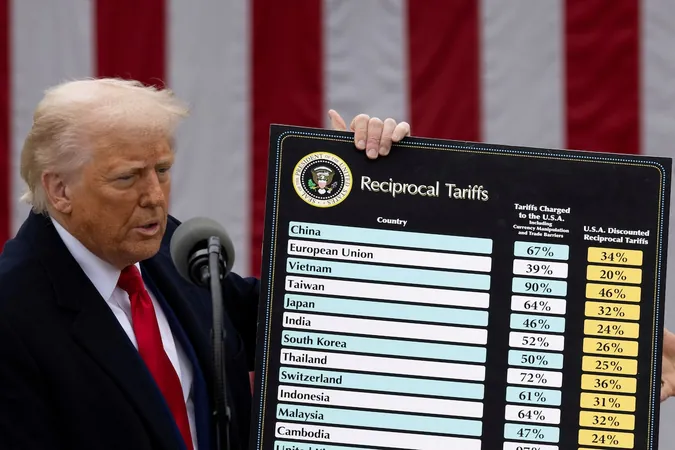
Scottish Exporters Reeling from Trump's New Tariffs: What This Means for Economy and Trade
2025-04-03
Author: William
Scotland's export giants are facing an uncertain future following the announcement of President Donald Trump’s new 10% tariffs on a variety of imports, majorly impacting products like whisky and salmon, which are staples of the Scottish economy.
During a conference held at the White House, Trump detailed this unprecedented move, claiming it is a necessary step to "liberate" the American market from foreign competition. The tariffs will vary by country, but for Scotland, a region heavily reliant on exports to the United States, this is a significant setback.
First Minister John Swinney expressed his disappointment, describing the new levies as "very damaging" to the Scottish economy, which counts the U.S. as its most crucial trading partner. Swinney highlighted the hope that Trump's familial ties to Scotland might facilitate better trade relations, pointing out that the U.S. market accounted for 17%—approximately £4 billion—of Scotland's total exports.
The Scotch whisky sector, which saw exports to the U.S. alone valued at £971 million in 2024, is particularly hard hit. Anthony Wills, owner of Kilchoman distillery on the Isle of Islay, noted that the new tariffs represent 10% of his sales, complicating matters further against the backdrop of existing economic challenges. Whisky producers had previously experienced a 25% tariff in 2019 that was estimated to cost the industry around £600 million over two years.
“What we feared has become our reality again,” Wills shared with concerns that he'll need to raise prices to maintain profitability, potentially losing customers to cheaper alternatives like American bourbon, which faces no tariffs under the new regulations.
Similarly, the salmon sector, another crucial component of Scotland's exports with £225 million worth sold to the U.S. last year, is also facing significant challenges. Tavish Scott, CEO of Salmon Scotland, expressed optimism about American consumer loyalty but acknowledged the difficulty of passing on the cost of tariffs to businesses and consumers.
Trump's aggressive tariff strategy does not stop at whisky and salmon. He recently announced additional tariffs on foreign-built cars and increased duties on steel and aluminum imports, raising fears of a budding trade war that could escalate tensions between nations.
Amid these developments, the Fraser of Allander Institute has downgraded its economic forecasts for Scotland, attributing this shift to growing unease among firms partly due to the worries surrounding new tariffs.
The political ramifications are significant as well. UK Prime Minister Sir Keir Starmer stated that all options should remain on the table in response to these tariffs, emphasizing the need to prevent a trade war that could damage both economies.
As Scottish ministers travel to the U.S. for Tartan Week celebrations, there are concerns among exporters that without proactive negotiation efforts, the tariffs could hinder Scotland's economic recovery and growth potential. The urgency is clear: these tariffs represent not just a financial hit but also a looming threat to Scotland's cherished products and its overall economic stability.
As we monitor the situation closely, the real question remains—how will Scottish businesses adapt in the face of these new trade barriers, and can they find a way to thrive in this tumultuous economic landscape? Stay tuned for updates on this developing story!









 Brasil (PT)
Brasil (PT)
 Canada (EN)
Canada (EN)
 Chile (ES)
Chile (ES)
 Česko (CS)
Česko (CS)
 대한민국 (KO)
대한민국 (KO)
 España (ES)
España (ES)
 France (FR)
France (FR)
 Hong Kong (EN)
Hong Kong (EN)
 Italia (IT)
Italia (IT)
 日本 (JA)
日本 (JA)
 Magyarország (HU)
Magyarország (HU)
 Norge (NO)
Norge (NO)
 Polska (PL)
Polska (PL)
 Schweiz (DE)
Schweiz (DE)
 Singapore (EN)
Singapore (EN)
 Sverige (SV)
Sverige (SV)
 Suomi (FI)
Suomi (FI)
 Türkiye (TR)
Türkiye (TR)
 الإمارات العربية المتحدة (AR)
الإمارات العربية المتحدة (AR)